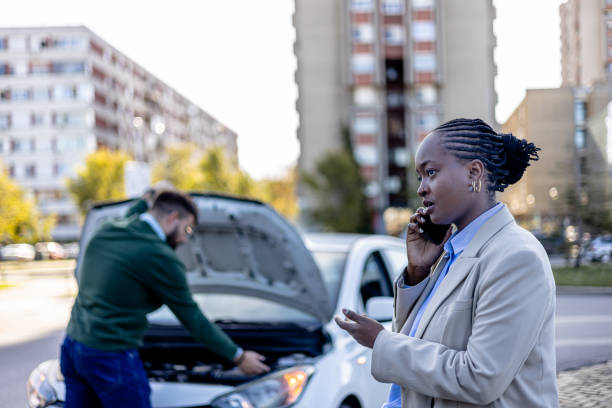(ThyBlackMan.com) Car accidents disrupt lives in an instant, leaving families to face challenges that go far beyond the physical injuries. For Black families, the emotional and financial toll can be especially difficult to manage. The suddenness of a crash often means there is little time to prepare for what comes next. Families must quickly juggle medical needs, legal matters, and the emotional strain that follows such trauma.
Recovery takes time, but the path isn’t always clear. Many families find themselves overwhelmed by the numerous decisions and unexpected expenses. The community support available can make a difference, yet there is still a need for more tailored resources that understand the unique pressures Black families face after a car accident. It is crucial to recognize these challenges to provide meaningful help and ensure that families do not feel isolated during recovery.
In addition, many Black families face mistrust toward medical and legal institutions due to historical and ongoing disparities. This can lead to hesitation in seeking help or engaging with professionals after an accident. Building trust through culturally competent care and advocacy is vital to helping families feel safe and supported through the recovery process.
What a car accident means beyond the crash
According to Emerson Straw, a car accident involves more than just the collision; it can disrupt daily life in ways that are often overlooked. Injuries can range from minor to life-altering, affecting work, school, and family routines. The stress of coping with medical bills and lost income adds to the weight that families carry. For many in the Black community, existing economic disparities make these hardships harder to overcome.
Access to quality healthcare and legal assistance can be uneven, creating additional barriers to recovery. Insurance complications and delays in claims processing leave families vulnerable. The effects ripple through the household, sometimes impacting mental health and relationships. Understanding this broader picture helps highlight why recovery support must be comprehensive and culturally sensitive.
This situation can also affect children and extended family members who rely on the injured person for stability. The ripple effects reach into education, childcare, and household management, intensifying pressure on everyone involved. Recognizing these extended impacts encourages a more compassionate approach to supporting families beyond the immediate accident.

The role of community support after trauma
Strong community ties often provide essential support following an accident. Family, friends, and local organizations can step in to assist with caregiving, transportation, and emotional encouragement. For Black families, community networks can offer a source of strength that helps counterbalance the difficulties caused by the accident.
However, these networks sometimes face limitations, especially when resources are stretched thin. It’s important to recognize the burden placed on community members who support accident victims while managing their own responsibilities. Efforts to improve access to professional services must work alongside strengthening these grassroots connections. This balance creates a more reliable safety net for families in need.
Moreover, faith-based groups and cultural organizations play a significant role in many Black communities. They often provide a sense of belonging and practical help that formal services may not offer. Encouraging partnerships between these groups and healthcare or legal providers can enhance support for families navigating recovery after a car accident.
Legal and financial concerns after a crash
Legal challenges often arise when dealing with insurance companies and potential claims. The process of securing compensation can be complicated and stressful. For Black families, systemic biases in legal and financial systems may further complicate efforts to get fair treatment. This reality highlights the need for accessible and knowledgeable legal advice that respects the experiences of Black accident victims.
Financial strain extends beyond immediate medical costs. Long-term expenses, including rehabilitation and lost wages, create ongoing pressure. Without adequate support, families may face difficult choices that affect their stability. Advocating for fair policies and providing clear guidance can help reduce this burden and empower families to focus on healing.
It’s also important to note that many Black families may be unaware of their legal rights or hesitant to pursue claims due to distrust or past experiences. Education and outreach tailored to cultural needs can help bridge this gap, ensuring families understand their options and receive the justice they deserve.
Emotional toll and healing
The emotional impact of a car accident is often underestimated. Survivors and their loved ones may deal with anxiety, depression, or post-traumatic stress. These feelings can affect daily functioning and strain relationships within the family. Black communities sometimes encounter stigma around mental health, which can discourage seeking help at critical times.
Healing requires attention to both physical and emotional needs. Encouraging open conversations and offering culturally sensitive mental health resources can improve recovery outcomes. Supporting the whole person—not just the injury—strengthens resilience and promotes a healthier, more hopeful future for families affected by car accidents.
Additionally, younger family members who witness the accident or its aftermath may experience trauma that goes unspoken. Providing safe spaces for children and teens to express their feelings and access support is vital. This holistic approach helps prevent long-term emotional struggles within the entire family unit.
When a car crash changes everything for Black families
Car accidents can change the course of a family’s life in profound ways. For Black families, the experience is shaped by unique social and economic factors that require thoughtful consideration. Challenges like unequal access to care and legal support call for community-focused solutions that respect cultural context.
At the same time, the resilience found within Black families and communities is a powerful force. By recognizing the full scope of what a car accident entails, we can build better support systems that honor that strength. Together, we can help families move forward from tragedy toward recovery and renewed hope.
Moving forward, it’s essential for policymakers, healthcare providers, and community leaders to listen to and prioritize the voices of Black families affected by car accidents. Only through collaboration and empathy can the barriers be broken down and true healing begin.
Staff Writer; Patrick Jacobs

















Leave a Reply